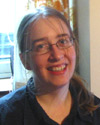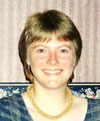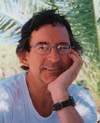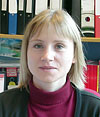 |
 |
 |
 |
 |
 |
|
|
||||
|
Contributors |
|||
 |
I first became interested in learner's dictionaries more than 10 years ago while teaching English in Lithuania. I became a lexicographer with Cambridge University Press in 1999 and since then I have been involved in several ELT publications including Cambridge Advanced Learner's Dictionary, Cambridge Learner's Dictionary, the CD-ROM versions of the Macmillan English Dictionary and Macmillan Essential Dictionary as well as the Macmillan Schools Dictionary website. I have contributed to several websites – writing articles, designing web pages as well as adapting and creating interactive activities and games. I work from my home in Perthshire and most of my spare time is taken up with my baby son Aonghas (Gaelic for 'Angus') and walking my parents' border collie, Misty. |
|||
 |
Kerry has a first degree in computational linguistics and an MA in theoretical linguistics from the University of Manchester, specialising in syntactic theory. For several years she worked as a researcher at Manchester and Essex universities, where in connection with European projects on machine translation, she was involved in computational lexicography, co-ordinating research in computational descriptions of compounds and collocations, and presenting her work in various international academic contexts. In 1993 she joined Cambridge University Press as a lexicographer/editor and grammar consultant, and worked on a large number of Cambridge learner's dictionaries, including the English Pronouncing Dictionary, the Cambridge International Dictionary of Phrasal Verbs and the Cambridge Learner’s Dictionary in print and CD-ROM versions. In June 2001 Kerry moved to York where she now works as a freelance editor/lexicographer and is involved in a range of dictionary and grammar projects. |
|||
 |
I have been a lexicographer since 1980, following a short and not very brilliant career as an academic, then as an English language teacher. Although I got into the dictionary field completely by accident, I've been lucky enough to be involved in all the major developments over the last 20 years or so. I worked for a time at COBUILD during the earliest days of corpus lexicography, then for over ten years at Longman, and most recently I have been dividing my time between Macmillan's exciting dictionary publishing programme and my own business as a trainer and project manager. As Managing Editor at Longman Dictionaries (1984-1994), I was responsible for several big dictionary projects, including the Longman Dictionary of Contemporary English (1987 and 1995 editions), and the Longman Language Activator (1993). Since 1998, I have been a lexicographic consultant for Bloomsbury Publishing Plc, who planned and wrote the Macmillan English Dictionary for Macmillan. As well as designing, editing, and project-managing dictionaries, I've been very involved in the design and collection of several major corpora, including the Longman Learner Corpus (the first of its type, which we started developing in the late 1980s), and the British National Corpus. I've also worked with computer scientists and software engineers in the creation of computational tools for analyzing the data in corpora, most recently the "Word Sketch Engine", a state-of-the-art corpus query system developed by my colleague Adam Kilgarriff. Over the past 15 years or so, I have trained dozens of lexicographers, and also done quite a lot of university teaching in this field. Throughout the 1990s, I taught on lexicography courses at the University of Exeter, and in 2002-2003 taught on the MSc programme in Lexical Computing and Lexicography at the University of Brighton. For the past five years, I have been working with Sue Atkins (probably the world's leading bilingual lexicographer) and Adam Kilgarriff (a brilliant computational linguist, who supplied the "Word Sketches" used in the writing of MED) in our own company, Lexicography MasterClass Ltd (LexMC). LexMC has run training workshops in lexicography and lexical computing (in venues such as South Africa, Denmark, China, Japan, and the UK), provides a corpus-development service, and manages dictionary projects for other institutions. Our annual Lexicom workshop is now in its fifth year, and our most recent venture was managing a major new project (funded by the Irish government) to produce a new, corpus-based English-Irish dictionary. I have written numerous papers on corpus-based pedagogical lexicography, and I also wrote a regular column for about three years on aspects of corpora in language learning for the Pilgrims' "webzine" Humanizing Language Teaching. Apart from writing dictionaries, I train regularly in T'ai Chi, I'm trying to learn Spanish and (to a more limited extent) Japanese, and I am active in local politics (as a member of an environmental group opposing inappropriate development in Canterbury, where I live). I also like movies and watching (but not playing) cricket, and wrote The Dictionary of Cricket (OUP) in 1995. My wife Maggy is a writer and editor, and her most recent book is the 3rd edition of the Palgrave Macmillan Dictionary of Women's Biography. Our son Raphael is 25 and works in London for Accidental Records – a small record company owned by the musician Matthew Herbert – as well as moonlighting as a DJ under the name Raf Daddy. Our daughter Jess is 20, and doing a degree in Classics at Leeds. Dictionaries have improved enormously in the last 25 years,
but I'm convinced there is still plenty of scope for making them even
better – and this is why working with dictionaries is always so interesting
and challenging. As the father of modern computing, Alan Turing, once
said: "We can only see a short distance ahead, but we can see plenty
there that needs to be done." |
|||
| Meet the Editor | ||||
 |
Kati
Sule
I come from Hungary. I studied English Language and Literature at the University of Szeged in south-east Hungary where I also completed an English Language Teaching degree. I taught English as a foreign language in Hungary and in the Netherlands. I am Managing Editor of the Macmillan Dictionaries series and was editor of the Macmillan English Dictionary Workbook. I am also one of the editors of the Macmillan English Dictionaries resource site. I live in Amsterdam and frequently travel to the UK. I'm a keen but rather lazy runner. In my free time I enjoy playing squash, watching films and reading. |
|||
| Cover illustration
by Martin Shovel Cover photograph © Royalty-Free/Corbis Cover design by Mairi MacDonald |
||||
|
|
||||